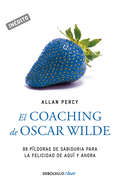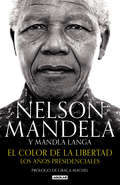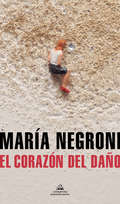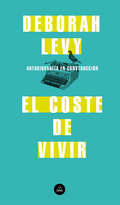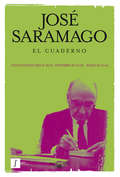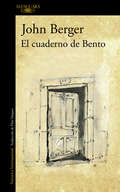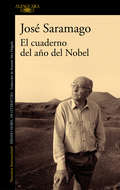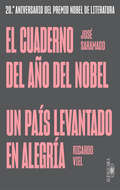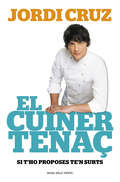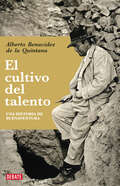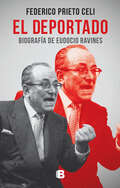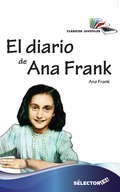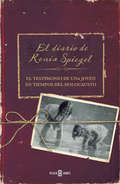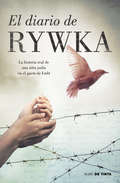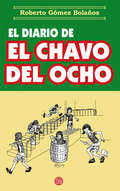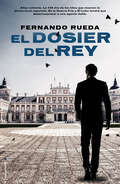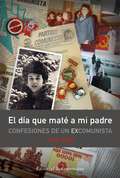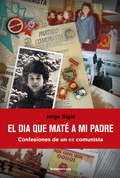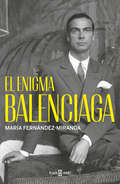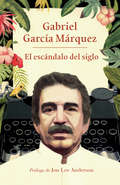- Table View
- List View
El coaching de Oscar Wilde
by Allan PercyAdemás de un brillante escritor, dramaturgo y polemista, Oscar Wilde está considerado el mejor autor de aforismos de la historia moderna. Sus célebres pensamientos de una sola frase son ingeniosos y profundos.El autor de Nietzsche para estresados toma 99 perlas de sabiduría de quien, justamente por su vida centrada en los placeres, conoció todos los extremos del alma humana, y traslada sus mensajes a situaciones actuales para enseñarnos a sortear los problemas y gozar de la vida sorbo a sorbo.
El cocinero tenaz: Si te lo propones, lo consigues
by Jordi CruzLos ingredientes que componen el éxito de Jordi Cruz, uno de los cocineros más innovadores y populares del momento. En un mundo tan competitivo como el de la cocina, Jordi Cruz destaca como un perfil de éxito que trasciende a los fogones y se transforma en el de una persona tremendamente joven que en pocos años ha conseguido varias estrellas Michelin, creando un estilo único como cocinero y comunicador. ¿Qué se esconde detrás de este éxito? Jordi Cruz nos explica en El cocinero tenaz cómo descubrió su vocación por el oficio de cocinero cuando apenas tenía 7 años, cómo enfocó su formación, en la que destaca el aprender haciendo, y la estrategia que le ha llevado a convertirse en uno de los cocineros más admirados en España. Jordi también nos introduce en su filosofía para encarar la innovación y la creatividad y los secretos para mantener un equipo motivado y fiel. Este libro desvelará que detrás del éxito de Jordi Cruz se encuentra una tenacidad incansable y un compromiso con su oficio, unidos a una ambición por hacer siempre algo nuevo, a partir de la tradición. la cocina de jordi cruz; libro de cocina de jordi cruz; master chef; cocina innovadora y creativa; manual de cocina; los mejores libros de cocina; aprender a cocinar; biografia de jordi cruz; estrellas michelin;
El color de la libertad: Los años presidenciales
by Nelson Mandela Mandla LangaEl color de la libertad continúa las memorias que Mandela publicó en El largo camino hacia la libertad, relatando sus años como presidente. La extraordinaria historia de un país en transición y los retos que afrontó el premio Nobel de la Paz al luchar por que su visión de una Sudáfrica liberada se convirtiera en realidad. «He descubierto el secreto de que, tras subir a una colina, uno descubre que hay muchas más colinas detrás. Me he concedido aquí un momento de reposo, para lanzar una mirada hacia el glorioso panorama que me rodea, para volver la vista atrás hacia el trecho que he recorrido. Pero solo puedo descansar un instante, ya que la libertad trae consigo responsabilidades y no me atrevo a quedarme rezagado. Mi largo camino aún no ha terminado.»Nelson Mandela, El largo camino hacia la libertad En 1994, Nelson Mandela se convirtió en el primer presidente democrático de Sudáfrica. Desde el comienzo, se comprometió a ocupar el cargo durante una única legislatura de cinco años. A lo largo de su presidencia, tanto él como su gobierno garantizaron que todos los ciudadanos sudafricanos fueran iguales ante la ley, y sentaron las bases para que un país desgarrado por siglos de colonialismo y apartheid se convirtiera en una democracia plenamente operativa. El color de la libertad es la historia de los años presidenciales de Mandela, una obra basada en gran medida en las memorias que él empezó a escribir cuando estaba concluyendo su legislatura, pero que no pudo terminar. Ahora, el prestigioso escritor sudafricano Mandla Langa ha completado la labor, utilizando el inacabado borrador de Mandela, las notas detalladas que el presidente fue tomando a medida que se desarrollaban los acontecimientos y una ingente cantidad de material clasificado. Prologado por la viuda de Mandela, Graça Machel, el resultado es un relato vívido y a menudo inspirador de la presidencia de Mandela y de la creación de una nueva democracia.
El consentimiento
by Vanessa SpringoraLA NOTICIA LITERARIA DEL AÑO APLAUDIDA POR LA PRENSA MUNDIAL: la Nueva Gran Novela Francesa, ganadora del Gran Premio de las Lectoras de Elley del Premio Jean-Jacques Rousseau y número 1 en ventas. «Tiene todos los ingredientes para dar un aldabonazo en la conciencia social, y lo está dando. Sobrio, sereno y factual, el relato de Springora no tiene nada de sensacionalista, y aun así es impactante. [...] Un libro que nos golpea de la primera página a la última.»Laura Freixas, La Vanguardia Con trece años, Vanessa Springora conoce a Gabriel Matzneff, un apasionado escritor treinta y seis años mayor que ella, tras cuyo prestigio y carisma se esconde un depredador. Después de un meticuloso cortejo, la adolescente se entrega a él en cuerpo y alma, cegada por el amor e ignorante de que sus relaciones con menores llevan años nutriendo su producción literaria. Más de treinta años después de los hechos, Springora narra de forma lúcida y fulgurante esta historia de amor y perversión, y la ambigüedad de su propio consentimiento. Su maravillosa novela ha hecho, según el diario Le Monde, «arder Saint-Germain-desPrés»: el caso Matzneff cuestiona a la intelectualidad francesa y a una sociedad obnubilada por el talento y la celebridad. La crítica ha dicho...«Uno de los acontecimientos editoriales de esta inusual temporada en España. Estamos ante la última gran novela francesa, con todo lo que esta frase supone, y su autora, la también editora Vanessa Springora, está a la altura de sus compatriotas Delphine de Vigan o Emmanuel Carrère, imprescindibles en cualquier canon de la literatura actual de no ficción. Pero, en el caso de Springora, su proeza narrativa (escribe con la soltura de quien lleva toda la vida esperandopara hacerlo) es digna del mayor reconocimiento, tanto por parte de la crítica como de la sociedad francesa, la misma que, durante años que terminaron siendo décadas, miró para otro lado.»Inés Martín Rodrigo, ABC «El rostro de una incómoda constatación: todos lo sabían y nadie hizo nada.»María D. Valderrama, elDiario.es «Hablar con Vanessa Springora es como entrevistar a Lolita si hubiera podido rehacer su vida tras su historia con Humbert Humbert. Pero hay muchas diferencias: Springora existe, está viva y encima cuenta ella, con su propia voz, lo que sucedió.»Xavi Ayén, La Vanguardia «No hay entre las páginas elocuentes y nada revanchistas de El consentimiento ápice de manifiesto panfletario. [...] Los hechos que se cuentan, esa historia de amor consentida y cancelada al mismo tiempo por la propia autora, son reales. Pero su estructura novelada, su carácter de narración literaria, la convierte en algo más que un testimonio.»Marta Moleón, La Razón «Profundamente doloroso. [...] La autora ha sabido encontrar el tono justo, la serenidad y la claridad de ideas necesaria para escribirlo de tal modo que la historia fluya con agilidad a pesar de las sacudidas que esconde. [...] Léanlo.»Mònica Planas, Ara «Springora torpedea el cinismo con el que aún se encubre la pederastia y [...] representa un paso más en el proceso que han emprendido las mujeres de activar un punto de vista crítico en relación al mundo.»Anna Caballé, El País «Una bomba de profundidad en el seno de la intelectualidad francesa con un debate que tiene una compleja y retorcida argumentación.»Elena Hevia, El Periódico «Hay libros que cuentan la realidad y parecen de pura y terrible ficción. [...] Sencillo, durísimo, inverosímil.»A&L, Heraldo de Aragón «Una escritura sencilla, precisa y sabia, un lenguaje clásico, luminoso y justo. Elegan
El corazón del daño
by María Negroni«Mi madre: la ocupación más ferviente y más dañina de mi vida.» «La prosa de Calvino es el único antecedente que se me ocurre de los textos sofisticados de María Negroni. Uno la lee con la rara certeza de que esto es literatura, una secuencia de enunciados apasionados y tristes que nunca abandonan la singular elegancia de su dicción.»Richard Howard, The Paris Review Recopilación privada; ajuste de cuentas con una madre desesperada y desesperante; desmontaje de una vida que va de la simbiosis al enfrentamiento, de la huida de la casa familiar a la clandestinidad revolucionaria, de la migración al descubrimiento de sí a través de la escritura, El corazón del daño es un dispositivo literario abierto y complejo que busca, en palabras de su autora, ser fielmente "un censo de escenas ilegibles". Con una narrativa directa y voluptuosa a la vez, Negroni recurre a la nota íntima, la observación sagaz, la apostilla urbana, la crónica política, la balada del exilio y al canto lúgubre del duelo para escribir "un pequeño libro de mi puño y cuerpo, seguramente errado en su tristeza". La crítica ha dicho... «Una misteriosa configuración de presencia y ausencia. Un intrincado paisaje simbólico de la identidad, donde es posible atisbar la peligrosa y siempre elusiva frontera entre realidad e irrealidad.»Nicole Brossard «Con una precisión magnífica y una especie de impersonal rigor, María Negroni revela, sin decirnos exactamente cómo, el amoroso accidente, la amorosa deficiencia de existir, su poético desajuste.»Luis Chitarroni «Negroni escribe como nadie y lee lo que nadie. Es la descendiente única de un linaje rarísimo.»Miguel Dalmaroni «Escritora de márgenes, María Negroni nunca cumple las expectativas del prejuicio ni escoge sus temas en función de modas o dictámenes. Habita las palabras con la fuerza, la intensidad y la fiereza de quien hace de la literatura un acontecimiento. Único. Distinto. Hermoso.»Esther Peñas
El coste de vivir
by Deborah Levy¿Qué quiere decir ser libre como mujer o como artista? ¿Y cuál es el precio de esta libertad? Cosas que no quiero saber y El coste de vivir forman la «autobiografía en construcción» de Deborah Levy, un relato de la feminidad como libertad y no como castigo. Deborah Levy empieza a escribir este libro cuando, con cincuenta años, se ve forzada a reinventarse: su matrimonio ha terminado, sus ingresos escasean, su madre se está muriendo y sus hijas empiezan a abandonar el nido. En un momento en que la vida tendría que volverse plácida e imperturbable, Levy decide abrazar el caos y la inestabilidad a cambio de recuperar, oculto bajo capas y capas de resignación, un nombre propio. A través de un diálogo con intelectuales como Marguerite Duras o Simone de Beauvoir, y mediante recuerdos que evoca con elocuencia, sensibilidad y un delicioso sentido del humor, Levy se pregunta cuál esese papel ficticio escrito por hombres e interpretado por mujeres al que llamamos «feminidad». Cualquiera que haya luchado por ser libre y por construir una vida propia sabe que es precisamente eso: una lucha constante en la que se paga un coste por vivir. La crítica ha dicho...«Sabia, sutil e irónica. Cada frase de Levy es una obra de arte de claridad y elegancia. Una escritora brillante.»The Daily Telegraph «Una observadora astuta de lo mundano y lo inexplicable. Levy esboza detalles memorables en pocos trazos.»The New York Times Book Review «Un manifiesto para un estilo de vida arriesgado y radical, como seguir nadando cuando ya no haces pie.»The New Statesman «Levy, a sus cincuenta y largos, no escribe sobre su vida para su generación, sino para las que vienen.»Harper's Magazine «El coste de vivir es el precio que debe pagar una mujer para desmontar un hogar en el que ya no se siente como en casa. Para Levy, este acto radical da inicio a la búsqueda de una nueva vida que resulta inseparable de la búsqueda de una nueva narrativa.»The Times «Un manifiesto elocuente para lo que Levy llama "una nueva manera de vivir en el mundo post-familiar".»The Guardian «Esta mirada oportuna al modo en que las mujeres son vistas (y a menudo ignoradas) resonará entre muchos lectores.»Publishers Weekly «Bello, melancólico. El poder de las palabras para conceder vida tras la muerte y la importancia de escoger lo que sigue vivo entre lo que ha muerto están en el corazón de la exquisita prosa de Levy.»The Spectator «Extraordinario y bello. Extendiéndose amplia y profundamente sobre el matrimonio, la maternidad, el amor, la muerte y la amistad, esta obra está repleta de una inteligencia feroz, una humanidad generosa y unas ideas afiladas.»The FinancialTimes
El cuaderno
by José SaramagoEl cuaderno recoge los comentarios escritos por el Premio Nobel portugués desde que creó su blog hasta marzo de 2009. La obra despierta el interés de los lectores por la lucidez y la inteligencia de Saramago para retratar la realidad de nuestros días. Para la traductora de la obra, Pilar del Río, este libro son seis meses de «notas inteligentes para lectores inteligentes, sin artificios». «Cuando en febrero de 1993 nos instalamos en Lanzarote, conservando siempre casa en Lisboa, mis cuñados María y Javier, que ya vivían allí desde hacía unos años, junto a Luis y Juanjo, recién llegados, me regalaron un cuaderno para que sirviera de registro de nuestros días canarios. Me ponían sólo una condición: que de vez en cuando los mencionara. Nunca escribí nada en tal cuaderno, pero así, de esta manera, y no por otras vías, nacieron los Cuadernos de Lanzarote, que durante cinco años verían la luz. Hoy, sin esperarlo, me encuentro en una situación parecida. Esta vez, sin embargo, las causas motoras son Pilar, Sérgio y Javier, que se ocupan del blog. Me dijeron que habían reservado un espacio para mí en el blog y que ahí debo escribir de todo, comentarios, reflexiones, simples opiniones sobre esto o aquello, en fin, lo que sea menester y venga al caso. Mucho más disciplinado de lo que frecuentemente parezco, les respondí que sí señor, que lo haría, siempre que no me fuera exigida para este Cuaderno la asiduidad que a mí mismo me impuse en los otros. Por lo tanto, y por lo que valga, cuenten conmigo.»JOSÉ SARAMAGO
El cuaderno de Bento
by John BergerUn libro único que cambia nuestra manera de percibir la vida y el arte. Durante su breve existencia, el célebre filósofo Baruch Spinoza, padre de la Ilustración, llevó un cuaderno de apuntes que se perdió tras su muerte. En El cuaderno de Bento, el pintor, ensayista, activista y novelista John Berger imagina el aspecto que podría haber tenido ese cuaderno: un reflejo de cómo el arte puede orientar la mirada. Un puñado de maravillosos dibujos, relatos iluminadores -como el de la anciana nadadora que tuvo que huir de Camboya-, y profundas reflexiones acerca de las flores, el cuerpo humano, el baile, los supermercados, los bufones de Velázquez, la ropa de bebé y las distintas formas de resistir a la crudeza del mundo. La crítica ha dicho:«Si buscas un escape, si deseas aprender, si te quieres entretener, léelo. Pero por encima de todo, si lo que buscas es inspiración, ¡léelo!»Everyday eBook «Una meditación que levanta el ánimo.»New York Times Style Magazine «Berger sigue siendo capaz de llevarnos a la indignación y el encantamiento.»The Boston Globe «Admiro y amo la obra de John Berger... En la literatura contemporánea, Berger me parece incomparable. Desde D. H. Lawrence no ha habido un escritor capaz de ofrecer al mundo tal atención sobre los problemas humanos más disímiles, con una sensualidad que no renuncia a los imperativos de conciencia y responsabilidad...»Susan Sontag «Toda obra de John Berger es un hito... sus admiradores reconocerán la característica mezcla de compasión y lucidez, honestidad discursiva, calor humano y ejemplaridad cosmopolita.»Times Literary Supplement «Uno de los intelectuales más lúcidos y comprometidos de su generación.»Clarín «Berger ofrece unas reflexiones inquebrantables acerca de las dificultades de nuestro tiempo y cómo podríamos afrontarlas.»The Forward «Una obra literaria que epitomiza el maravilloso mundo de la imaginación y el juego, y un recordatorio de cómo podemos llegar a ver realmente, si sólo fuésemos capaces de bajar el ritmo... Altamente recomendable.»New York Journal of Books «John Berger se ha convertido en una de las voces esenciales para comprender el estado de nuestra sociedad... Combina a la perfección compromiso y reflexión.»El Confidencial «Déjalo en la mesilla de noche o mételo en la mochila que te llevas a la playa.»The Washington Independent Review of Books «Fue la voz de los frágiles, residuos del mundo moderno a los que su obra otorgó dignidad de reyes# Poeta, novelista, ensayista y crítico de arte, toda su obra literaria es el testimonio de alguien que contempla un universo que se desvanece ante sus ojos.»Javier Rodríguez Marcos, El País «Un autor esencial# La mirada de Berger era tan profunda como diversa# Una mirada humanista, rebelde y serena al mismo tiempo, la de un renacentista# En pocos autores se ha producido la fusión que él logró entre imagen y escritura.»Pedro Antonio Curto, El Comercio «Fue el Leonard Cohen de otra clase de rotunda melancolía: la de la tristeza (social, íntima) que provoca el auténtico saber en mitad de la sociedad capitalista de fauces abiertas y hambre incansable# Era un activista, su literatura viene de ahí, del compromiso a la manera de Albert Camus, de la protesta, de la obsesión con el poder y sus lepras.»Diego Medrano, El Comercio
El cuaderno del año del Nobel
by José SaramagoUn hallazgo inesperado con el que celebrar el 20.º aniversario de la concesión del Premio a José Saramago. «Eran días de hace veinte años, eran días de hoy. El autor diciéndose de nuevo en Lanzarote, las palabras saliendo a borbotones, mes a mes, un año entero, ese año.»Pilar del Río Fruto de un hallazgo fortuito en el archivo de José Saramago, este libro es el último de los diarios personales que el escritor portugués dejó escrito y que se quedó, como declara el propio autor, «agarrado al disco duro del ordenador.» En sus páginas, que recorren día a día la vida de José Saramago durante 1998, hay apuntes personales, sí, pero sobre todo hay reflexiones e ideas sobre su postura cultural y ética. Ahí radica, sin duda, su excepcionalidad: en ellas el lector descubre que la manera de entender el mundo de Saramago -siempre desde la perspectiva del ser humano, siempre desde la sensibilidad hacia los desfavorecidos, los vulnerables, los oprimidos por el sistema- es hoy más necesaria, más urgente que nunca. Su voz nos llega invariablemente viva porque, como él intuía, el tiempo es una tira elástica, y estar cerca o lejos solo depende de la voluntad. Cuando se cumplen veinte años desde la concesión del Nobel, ve la luz este diario -tal como José Saramago lo dejó escrito- junto con las cuatro conferencias que impartió en 1998, un año que cambió para siempre la vida y la obra del autor. La crítica ha dicho sobre el autor y su obra:«Un hombre con una sensibilidad y una capacidad de ver y de entender que están muy por encima de lo que en general vemos y entendemos los comunes mortales.»Héctor Abad Faciolince «El José Saramago que escribió y reflexionó hasta el final de su existencia era un transgresor; transgresor en la literatura, en la vida y ante las normas de conducta marcadas por la burguesía.»Yanet Aguilar Sosa, El Universal «Hay que saludar este regreso de Saramago, siempre excepcional escritor, a su realismo inicial, y animarle a que siga por este camino...»Rafael Conte, Babelia (sobre Las pequeñas memorias) «El tono siempre filosófico de Saramago alcanza en Todos los nombres una nitidez y un despojamiento que permite hablar de una voluntad de indagación metafísica [...]. Saramago ha hecho un relato denso, pero no aburrido; es exigente en sus metas, pero su trama no permite que desfallezca la atención.»Santos Sanz Villanueva, El Mundo (sobre Todos los nombres) «Saramago es un gran narrador y rara vez escapa al criterio de mantener en vilo al lector...»Jordi Gracia, La Vanguardia (sobre Todos los nombres) «Probablemente la obra más soberana y feroz de su indiscutible bibliografía narrativa... Se ha ganado no sólo la admiración sino también el respeto de todo buen lector por su constante superaciónde lo ya conseguido, libro tras libro...»Robert Saladrigas, La Vanguardia (sobre Ensayo sobre la ceguera)
El cuaderno del año del Nobel | Un país levantado en alegría: (edición especial por el 20º aniversario del Premio Nobel de Literatura)
by José Saramago Ricardo VielEsta edición especial en formato estuche de El cuaderno del año Nobel celebra el vigésimo aniversario de la concesión del Premio Nobel de Literatura a José Saramago. Los diarios del escritor vienen acompañados de Un país levantado en la alegría, una reconstrucción de los días que rodearon al nombramiento del Nobel editada por Ricardo Viel. «Eran días de hace veinte años, eran días de hoy. El autor diciéndose de nuevo en Lanzarote, las palabras saliendo a borbotones, mes a mes, un año entero, ese año.»Pilar del Río Fruto de un hallazgo fortuito en el archivo de José Saramago, El cuaderno del año del Nobel es el último de los diarios personales que el escritor portugués dejó escrito y que se quedó, como declara el propio autor, «agarrado al disco duro del ordenador». En sus páginas, que recorren día a día la vida de José Saramago durante 1998, hay apuntes personales, sí, pero sobre todo hay reflexiones e ideas sobre su postura cultural y ética. Ahí radica, sin duda, su excepcionalidad: en ellas el lector descubre que la manera de entender el mundo de Saramago -siempre desde la perspectiva del ser humano, siempre desde la sensibilidad hacia los desfavorecidos, los vulnerables, los oprimidos por el sistema- es hoy más necesaria, más urgente que nunca. Su voz nos llega invariablemente viva porque, como él intuía, el tiempo es una tira elástica, y estar cerca o lejos solo depende de la voluntad. Cuando se cumplen veinte años desde la concesión del Nobel, ve la luz este diario -tal como José Saramago lo dejó escrito- junto con las cuatro conferencias que impartió en 1998, un año que cambió para siempre la vida y la obra del autor. La crítica ha dicho sobre el autor y su obra:«Un hombre con una sensibilidad y una capacidad de ver y de entender que están muy por encima de lo que en general vemos y entendemos los comunes mortales.»Héctor Abad Faciolince «El José Saramago que escribió y reflexionó hasta el final de su existencia era un transgresor; transgresor en la literatura, en la vida y ante las normas de conducta marcadas por la burguesía.»Yanet Aguilar Sosa, El Universal «Hay que saludar este regreso de Saramago, siempre excepcional escritor, a su realismo inicial, y animarle a que siga por este camino...»Rafael Conte, Babelia (sobre Las pequeñas memorias) «El tono siempre filosófico de Saramago alcanza en Todos los nombres una nitidez y un despojamiento que permite hablar de una voluntad de indagación metafísica [...] Saramago ha hecho un relato denso, pero no aburrido; es exigente en sus metas, pero su trama no permite que desfallezca la atención.»Santos Sanz Villanueva, El Mundo (sobre Todos los nombres) «Saramago es un gran narrador y rara vez escapa al criterio de mantener en vilo al lector...»Jordi Gracia, La Vanguardia (sobre Todos los nombres) «Probablemente la obra más soberana y feroz de su indiscutible bibliografía narrativa... Se ha ganado no sólo la admiración sino también el respeto de todo buen lector por su constante superación de lo ya conseguido, libro tras libro...»Robert Saladrigas, La Vanguardia (sobre Ensayo sobre la ceguera)
El cuaderno del año del Nobel | Un país levantado en alegría: (edición especial por el 20º aniversario del Premio Nobel de Literatura)
by José Saramago Ricardo VielEsta edición especial en formato estuche de El cuaderno del año Nobel celebra el vigésimo aniversario de la concesión del Premio Nobel de Literatura a José Saramago. Los diarios del escritor vienen acompañados de Un país levantado en la alegría, una reconstrucción de los días que rodearon al nombramiento del Nobel editada por Ricardo Viel. «Eran días de hace veinte años, eran días de hoy. El autor diciéndose de nuevo en Lanzarote, las palabras saliendo a borbotones, mes a mes, un año entero, ese año.»Pilar del RíoFruto de un hallazgo fortuito en el archivo de José Saramago, El cuaderno del año del Nobel es el último de los diarios personales que el escritor portugués dejó escrito y que se quedó, como declara el propio autor, «agarrado al disco duro del ordenador». En sus páginas, que recorren día a día la vida de José Saramago durante 1998, hay apuntes personales, sí, pero sobre todo hay reflexiones e ideas sobre su postura cultural y ética. Ahí radica, sin duda, su excepcionalidad: en ellas el lector descubre que la manera de entender el mundo de Saramago -siempre desde la perspectiva del ser humano, siempre desde la sensibilidad hacia los desfavorecidos, los vulnerables, los oprimidos por el sistema- es hoy más necesaria, más urgente que nunca. Su voz nos llega invariablemente viva porque, como él intuía, el tiempo es una tira elástica, y estar cerca o lejos solo depende de la voluntad.Cuando se cumplen veinte años desde la concesión del Nobel, ve la luz este diario -tal como José Saramago lo dejó escrito- junto con las cuatro conferencias que impartió en 1998, un año que cambió para siempre la vida y la obra del autor. La crítica ha dicho sobre el autor y su obra:«Un hombre con una sensibilidad y una capacidad de ver y de entender que están muy por encima de lo que en general vemos y entendemos los comunes mortales.»Héctor Abad Faciolince «El José Saramago que escribió y reflexionó hasta el final de su existencia era un transgresor; transgresor en la literatura, en la vida y ante las normas de conducta marcadas por la burguesía.»Yanet Aguilar Sosa, El Universal«Hay que saludar este regreso de Saramago, siempre excepcional escritor, a su realismo inicial, y animarle a que siga por este camino...»Rafael Conte, Babelia (sobre Las pequeñas memorias) «El tono siempre filosófico de Saramago alcanza en Todos los nombres una nitidez y un despojamiento que permite hablar de una voluntad de indagación metafísica [...] Saramago ha hecho un relato denso, pero no aburrido; es exigente en sus metas, perosu trama no permite que desfallezca la atención.»Santos Sanz Villanueva, El Mundo (sobre Todos los nombres) «Saramago es un gran narrador y rara vez escapa al criterio de mantener en vilo al lector...»Jordi Gracia, La Vanguardia (sobre Todos los nombres)«Probablemente la obra más soberana y feroz de su indiscutible bibliografía narrativa... Se ha ganado no sólo la admiración sino también el respeto de todo buenlector por su constante superación de lo ya conseguido, libro tras libro...»Robert Saladrigas, La Vanguardia (sobre Ensayo sobre la ceguera)
El cuento de la bandera tachonada de estrellas
by Candice Kramer Karen Leon Alan Kramer Paul LevenoPerform this script about two children who travel back in time to be with Francis Scott Key as he writes "The Star Spangled Banner. "
El cuiner tenaç: Si t'ho proposes, te'n surts
by Jordi CruzEls ingredients que conformen l'èxit de Jordi Cruz, un dels cuiners més innovadors i populars de l'actualitat En un món tan competitiu com el de la cuina, Jordi Cruz destaca com a exemple d'èxit que transcendeix els fogons i es transforma en el d'una persona joveníssima que en molt pocs anys ha aconseguit varies estrelles Michelin i ha creat un estil únic com a cuiner i comunicador. Què s'amaga rere aquest èxit? Jordi Cruz ens explica a El cuiner tenaç com va descobrir la seva vocació quan tan sols era un nen de 7 anys, com va enfocar la seva formació i l'estratègia que l'ha ajudat a convertir-se en un dels cuiners més admirats. Ens introdueix, també, en la seva filosofia per a afrontar la innovació i la creativitat i els secrets per mantenir un equip motivat i fidel. Aquest llibre ens descobreix que rere l'èxit de Jordi Cruz hi ha una tenacitat incansable i un compromís amb el seu ofici, a més d'una ambició per,partint de la tradició, fer sempre alguna cosa nova.
El cultivo de talento: Una historia de buenaventura
by Alberto Benavides de la QuintanaLa historia en primera persona de uno de los empresarios más exitosos del Perú Los factores que llevaron a un empresario minero como Alberto Benavides de la Quintana a conseguir el éxito pueden encontrarse en los textos de este libro: el trabajo, la tenacidad y el esfuerzo. Pero hay que ir a lo profundo de sus propias palabras, a su vida misma y sus recuerdos, para encontrar ese afán de un hombre cuyo destino lleno de incertidumbre también, decide a más de 4 mil metros sobre el nivel del mar, los cimientos donde se apoyará para el resto de su vida: la fe y la buenaventura. Ingeniero y esposo, geólogo y padre, empresario y abuelo, buen discípulo y excelente maestro, una vida cuya tenacidad abrió un camino, forjó un estilo y nos dejó la veta que hasta ahora siguen las nuevas generaciones que aprendieron de él y hasta hoy siguen sus pasos. En El cultivo del talento, libro que contiene una selección de sus escritos y entrevistas, Alberto Benavides de la Quintana revela los pormenores de su trayectoria de empresario exitoso y de hombre comprometido con el destino del Perú.
El deportado: Biografía de Eudocio Ravines
by Federico Prieto CeliBIOGRAFÍA DE EUDOCIO RAVINES Eudocio Ravines, una de las personalidades más controvertidas y fascinantes de la política peruana e iberoamericana del siglo XX, tuvo una destacada trayectoria personal e ideológica, como lo demuestra esta documentada y minuciosa biografía, publicada originalmente en 1979, apenas algunos meses después del accidente que acabó con su vida en México.Esta segunda edición del libro, corregida y enriquecida por su autor con material extra, llega cuando la figura de Ravines ha cobrado un renovado y merecido interés entre los lectores peruanos y extranjeros. Federico Prieto Celi contribuye así a ponderar, desde una perspectiva contemporánea, toda la magnitud del incuestionable legado del político y periodista nacido en Cajamarca. El deportado, como apunta Prieto Celi, busca desagraviar y narrar la verdadera historia de un personaje que no dejó de sufrir persecuciones, destierros y ataques a lo largo de su extensa y sinuosa carrera política, en la que pasó de simpatizar con el aprismo, unirse a la Internacional Comunista y fundar el Partido Comunista Peruano a convertirse en uno de los más notorios y vehementes enemigos del comunismo y de las ideas de izquierda en nuestro país y el resto de la región.
El diario de Ana Frank
by Anne FrankDesde su encierro en el Anexo secreto, Ana Frank sueña con convertirse en escritora. Ella nunca lo supo, pero su famoso diario ha dado la vuelta al mundo, ha sido traducido a varios idiomas y se considera uno de los testimonios más genuinos del Holocausto. Por desgracia, Ana Frank murió muy joven y su diario quedó inconcluso, pero entre sus páginas todavía permanecen atrapados sus anhelos juveniles de amor, libertad y trascendencia.
El diario de Renia Spiegel: El testimonio de una joven en tiempos del Holocausto
by Renia SpiegelTras permanecer oculto más de setenta años, sale a la luz el diario de una joven judía polaca que relata su adolescencia y sus últimos días durante el Holocausto. Un testimonio de vida profundamente humano, veraz e impactante.Un legado de poesía y amor. Miércoles, 15 de julio de 1942 «Recuerda este día, recuérdalo bien. Se lo contarás a las generaciones que están por venir. Desde las ocho de hoy estamos encerrados en el gueto. Ahora vivo aquí. El mundo está aislado de mí y yo estoy aislada del mundo.» Renia Spiegel tiene quince años y es una adolescente como muchas otras. Le gusta escribir poesía, reunirse con las amigas y divertirse. Pero Renia es judía, vive en Polonia y estamos en 1939. Con el inicio de la Segunda Guerra Mundial, su mundo empieza a desmoronarse. Ese mismo año comienza un diario. En él relata su adolescencia marcada por la añoranza de su madre, por la amistad y por el amor, además de las atrocidades que la rodean. Pese a todo, el diario es un texto lleno de sensibilidad y ganas de vivir, en el que Renia menciona también la pena que siente por los soldados alemanes que ve desfilar a través del muro, tan jóvenes, tan lejos de sus seres queridos y tan cerca de la muerte. Asimismo, describe emocionada la primera vez que besa a su novio, cuatro horas antes de que los nazis invadan la Unión Soviética, sus miedos y las terribles humillaciones durante la creación del gueto. Será precisamente el chico quien firmará la desgarradora última entrada del diario, tres años después de que Renia lo empiece. Este extraordinario y conmovedor relato, rescatado en condiciones increíbles, llegó a manos de la madre y la hermana de Renia, quienes sobrevivieron al Holocausto, y ha permanecido oculto durante más de siete décadas, hasta la actualidad. _________________________________________________________________ Este testimonio inédito viene acompañado por una introducción de la historiadora estadounidense Deborah Lipstadt y un cuadernillo de fotos, así como por un prefacio, un epílogo y unas notas de Elizabeth Bellak, la hermana menor de la autora. «Durante la lectura del diario recordé, como les sucederá a muchos lectores, la icónica obra de Anne Frank. A Renia Spiegel, una joven llena de amor por la vida y que poseía la habilidad de describir la belleza del mundo que la rodeaba, se le negó con una bala lo que tanto quería: un futuro. De no ser por este diario, habría terminado, junto a otros millones de personas, en el cruel olvido que la mayoría de las víctimas del Holocausto tuvieron como destino. La han "rescatado" quienes conservaron el diario y quienes trabajaron para publicarlo. No pudieron salvarla de su cruel final, ni pudieron darle el futuro que tanto ansiaba, pero la rescataron del dolor añadido de ser olvidada.»Deborah E. Lipstadt, profesora Dorot de Historia del Holocausto en la Universidad de Emory Reseñas:«Han comparado a Renia Spiegel con Anne Frank por su conmovedor testimonio sobre la vida de los judíos durante la ocupación nazi de Polonia.»The Guardian «En una época donde el Holocausto queda tan lejos que incluso los supervivientes más jóvenes son ya ancianos, es especialmente potente descubrir una voz juvenil como la de Renia, que describe los acontecimientos en tiempo real.»Revista Smithsonian
El diario de Rywka Lipszyc
by Rywka LipszycEl diario verídico de Rywka Lipszyc, una joven superviviente de Auschwitz. Uno de los testimonios más desgarradores del Holocausto, perdido durante años, ve la luz por primera vez a nivel internacional. Rywka Lipszyc fue una chica judía de catorce años que vivió en el ghetto de Lødz, en Polonia. Entre 1943 y 1944 escribió un diario, en el que nos cuenta no solo los horrores de los que es testigo, sino también quiénes son sus amigos y su familia, cómo le va en el trabajo y en la escuela, y cuáles son sus sueños y esperanzas para el futuro. El diario fue hallado por una doctora del ejército ruso en el crematorio de Auschwitz, que lo guardó como un tesoro. Ahora, setenta años después, se ha conseguido traducir, revelando este maravilloso testimonio de cómo la vida transcurre incluso en los tiempos más oscuros, sacando a relucir lo más brillante del espíritu humano.
El diario del chavo del ocho
by Roberto Gómez BolañosCon tan sólo mencionar al Chavo del Ocho puede ponerse a la gente de buen humor. La gracia del Chavo del Ocho ha hecho reír al mundo durante 35 años, pero también se hace reflexionar; en la vecindad en que vive también han cabido el sarcasmo, la ingenuidad, la denuncia, la nostalgia, el ingenio, la ironía. Y es por eso que no hay este libro un solo párrafo que no contenga algo interesante; así, por ejemplo: "Los animales que comen carne se llaman carnívoros; los animales que comen frutas se llaman frutívoros; los animales que comen de todo se llaman ricos", "El profesor dijo que los primeros que usaron a los caballos fueron los chinos, pero la chilindrina dice que no, que antes los usaron las yeguas", "Y también había un presidente que se llamaba Porfirio Diaz, que fue el que por más tiempo soportó a los mexicanos ", etcétera. Además, ilustran esta edición dibujos del propio Roberto Gómez Bolaños.
El dosier del rey (Mikel Lejarza #Volumen 2)
by Fernando Rueda¿Estados Unidos y la CIA impulsaron a Juan Carlos I para conseguir el trono? ¿Tuvo algo que ver en la Operación Compás montada para evitar que la nieta de Franco y su marido Alfonso de Borbón le usurparan la sucesión? España, año 1980. El pueblo vive intensamente un cambio político plagado de conflictos, que no le permite ver en toda su dimensión cómo los servicios secretos de EEUU y sus aliados -entre los que se encuentra España- combaten encarnizadamente contra sus enemigos de la URSS y el Pacto de Varsovia. Las calles son el escenario de la Guerra Fría, en la que el espionaje español, controlado por militares, actúa demasiado pendiente de los intereses de la CIA, un servicio del que dependen hasta niveles insospechados. ETA ha decidido no asesinar durante las elecciones al Parlamento vasco. Mikel Lezarja, El Lobo, tiene que cumplir una extraña misión para la CIA que le molesta y no entiende: descubrir la doble vida de una alemana sospechosa de traición, a la que todos consideran culpable. Pronto comprenderá que en el mundo de las alcantarillas y el espionaje entre servicios secretos nada ni nadie es lo que parece. La crítica ha dicho...«Un thriller intenso y palpitante.»Todoliteratura «Una trepidante historia de espionaje ambientada en la España de 1980.»La voz de Galicia
El día que maté a mi padre: Confesiones de un ex comunista
by Jorge SigalUn libro extraordinario que cuenta una relación entrañable y feroz: ladel autor con el Partido Comunista Argentino. En forma de monólogos que acentúan su carácter dramático, Jorge Sigalcuenta su larga relación con el Partido Comunista argentino. Lasescenas se desarrollan con una fluidez fuera de lo común y revelan sobretodo la historia de extraños desenlaces, crímenes políticos, lealtadesy traiciones que acarreó el enfrentamiento de una creencia y unaideología con la dura realidad. Dirigidos a distintos interlocutores yaudiencias (entre los que pueden contarse un analista y una comitivade «camaradas»), cada uno de estos textos reunidos forma un conjuntonotable, tanto por su valor narrativo como por su importanciatestimonial. Especie de sueño heroico y pesadilla, «El día que maté a mipadre» es además el combate de un solo hombre contra una tribu deautoridades. Libro atrapante, esclarecedor, inolvidable.
El día que maté a mi padre: Confesiones de un ex comunista
by Jorge SigalMarguerite Yourcenar decía que el enemigo del fanatismo es el sentido común, y que pocas veces este último logra ganar la batalla. El día que maté a mi padre es una parte de esa batalla incesante. Una puesta en escena de esa negación y también del coraje de vivir con los ojos bien abiertos. Hijo de una familia judía que profesaba con naturalidad el amor por el marxismo-leninismo (los chicos jugaban en casa a ser soldaditos soviéticos), y particularmente de un padre omnipotente que muere por accidente de manera temprana, Sigal refugia su pronta orfandad en aquella fe de ideas irreductibles, aunque comienza a experimentar en secreto las crueles dudas de la lucidez. Reedición actualizada de un libro inolvidable, una obra sin ficción cuyo sentido de la verdad es hondo y estremecedor.Jorge Fernández Díaz
El enigma Balenciaga
by María Fernández-MirandaTodos reconocen su obra. Nadie conoce al hombre. Cristóbal Balenciaga no se dejaba ver en sus desfiles ni salía jamás a saludar tras finalizarlos. Si hacemos caso a la leyenda, el diseñador vasco seguía con detalle los pases a través de un discreto agujero practicado en las cortinas de terciopelo que decoraban su maison. Apenas existen retratos suyos, e incluso llegó a calar el rumor de que el hombre invisible de la alta costura no era más que una invención, una estrategia comercial elaborada con astucia. De lo que no cabe duda es de que «el mejor diseñador de todos los tiempos» -según reconocieron Christian Dior o Coco Chanel- antepuso siempre el prestigio a la fama y fue artífice de una obra inmortal, casi tan grande como el misterio que aún hoy envuelve su biografía. Este libro supone una original inmersión en una figura excepcional e irrepetible. María Fernández-Miranda se viste la piel del maestro y nos ofrece un retrato poliédrico en ocho escenas que dibujan con elegancia su geografía sentimental y creativa. Un mapa de paisajes, colores, tejidos y fragancias que nos conduce desde las empinadas calles de su Guetaria natal hasta las sofisticadas avenidas parisinas que protagonizaron la edad dorada de la alta costura, invitándonos a desvelar el enigma Balenciaga.
El equipaje de Alicia: Una historia de vida llena de fortaleza, convicción y amistad
by Alicia MejíaAlicia Mejía conversa con varios de sus más cercanos amigos sobre su carrera profesional en el mundo de las ferias que cambiaron la imagen de Colombia en el exterior. Colombiamoda, Colombiatex, Expoartesano o Colombia Provoca son algunas de las grandes ferias de exposición de Colombia, tanto dentro como fuera del país. Lo que pocos saben es que detrás de estos grandes eventos ha estado la misma persona: Alicia Mejía. Su empuje, coraje, convicción y constancia son de gran ejemplo para las nuevas generaciones. Esta es su historia, contada a través de entrevistas con varios de sus más entrañables amigos y compañeros de viaje: David Bojanini, Paula Jaramillo, Silvia Tcherassi, Lina Moreno y Lola Gavarrón, entre otros.
El escándalo del siglo
by Gabriel García MárquezDejó muy claro Gabriel García Márquez que el periodismo siempre fue su principal pasión, la más perdurable y por la que quiso ser recordado: “No quiero que se me recuerde por Cien años de soledad, ni por el premio Nobel, sino por el periódico. [...] Nací periodista y hoy me siento más reportero que nunca. Lo llevo en la sangre, me tira”. Esta antología pretende ser la muestra más representativa de la tensión narrativa entre periodismo y literatura que recorrió toda su trayectoria como reportero. Cubriendo cuatro décadas, este delicioso viaje a través de medio centenar de textos muestra como “el mejor oficio del mundo” está en el corazón de la obra del premio Nobel colombiano. Con edición a cargo de Cristóbal Pera y prólogo de Jon Lee Anderson, este volumen contiene piezas tan indispensables como los reportajes escritos desde Roma sobre la muerte de una joven italiana, suceso que permitió al autor pintar un fresco incomparable de las élites políticas y artísticas del país en un marco de novela policiaca, crónicas sobre la vida tras el “telón de acero”, sobre la trata de blancas desde París hasta América Latina o apuntes sobre Fidel Castro o Pío XII. Encontramos también fragmentos tempranos en los que aparecen por primera vez las familias Buendía y Aracataca, junto con artículos que contemplan la política, la sociedad y la cultura bajo la luz sólida, profunda y experimentada de ese gran contador de historias que siempre será maestro de periodistas.
